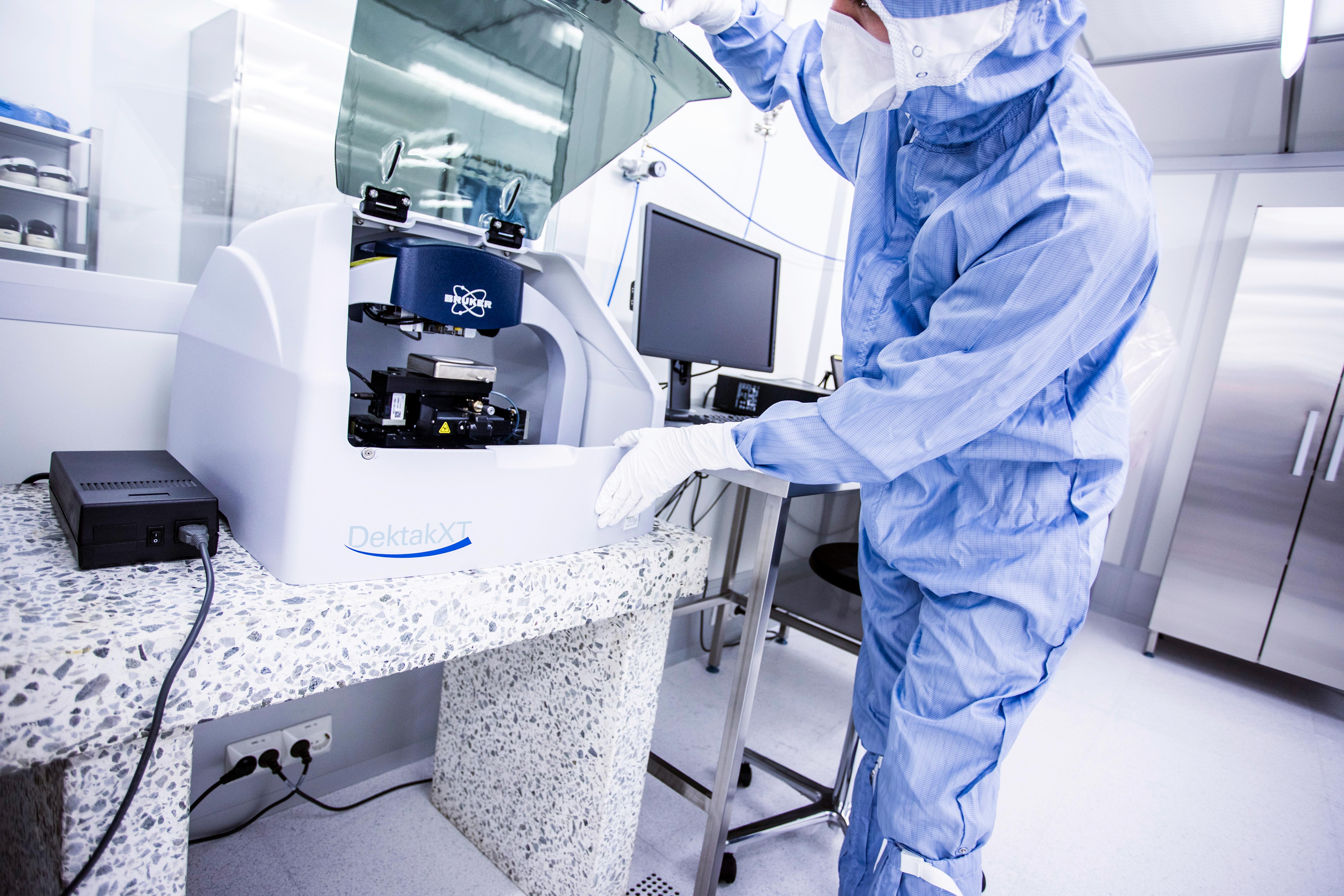Health technology creates wellbeing
Health technology already accounts for more than half of Finland’s high tech exports,* and even more business can be generated by developing better products and services to promote human health and wellbeing.

A graphic presentation of health technology exports is powerful and optimistic. In the past few years, the sector has shown strong growth and the future looks promising. Considering the problems that many countries are facing today – an ageing population, labour force shortages, and burgeoning healthcare costs – demand seems guaranteed. At the same time, technology and medicine are providing new and better ways of advancing human wellbeing.
Health technology is precisely the kind of sector that high-cost countries such as Finland should be investing in. Because making health tech products requires cutting-edge skills and knowledge, the sector will not attract competition from countries that build their competitive edge on offering cheap labour.
Finland’s health technology sector comprises approximately 300 companies. Their aggregate turnover comes to about EUR 2.6 billion, with exports accounting for as much as EUR 2.3 billion. In other words, the health tech sector already accounts for more than half of Finland’s technology exports. In fact, the sector’s trade surplus has grown to more than one billion euros a year.
Not enough leverage from the domestic market
But there’s a but. A convincing-looking curve indicating export growth can easily mask the fact that exports are mainly dependent on just a handful of big companies. Saara Hassinen, CEO of Healthtech Finland, an organisation that represents companies engaged in the sector, explains the numbers. According to her, the larger the companies become, the more desperately they need to venture into international markets.
“The Finnish market is far too small for these big companies”, Hassinen notes. Yet for small companies, the domestic market may well offer a much-needed springboard. A few successful deliveries in Finland may serve as a good reference, and help to establish a foothold abroad. “But for small health tech companies, Finland is – unfortunately – an extremely difficult market,” Hassinen deplores.
She goes on to explain that the importance of the domestic market to small companies is well-understood within the ministries, but the problem lies with municipalities and intermunicipal authorities – the health tech buyers – which tend to value no other criteria than price in their competitive tendering rounds. Indeed, there is room for improvement when it comes to public procurement. For instance, the law permits innovative procurement but buyers rarely take advantage of this opportunity.
“The Finnish healthcare and social welfare sector needs to gain traction. To achieve that, we’d need to adopt a broader perspective of the potential benefits; to incentivise the procuring units to be more open-minded. Buyers should focus on value rather than simply buying individual items at the lowest possible prices,” emphasises Hassinen.
Lack of talent stifles growth
Saara Hassinen is convinced that the big Finnish companies will continue to succeed in global markets. “But it’s not going to be easy, what with China waging a trade war and President Trump imposing duties. In the end, however, big companies do have the resources to tackle these challenges.”
Conversely, a small Finnish health technology company has no realistic chances of conquering the world on its own. Hassinen’s advice is to join forces with other small companies, or seek to become part of a larger export company’s ecosystem. Naturally, being the global industry leader in your specific niche is always a big plus.
According to Hassinen, a lack of talent is one of the biggest challenges facing companies, especially a lack of software specialists. Regulation represents another major challenge. “Europe will soon introduce new regulations concerning medical devices. Not all software providers are aware that whenever software is used in a medical device, the supplier is required to fulfil the relevant regulatory obligations.”
And, there’s another ‘but’. Admittedly, the growth figures are impressive, but in an industry where the global market grows at an annual rate of five per cent, they are by no means exceptional. Shouldn’t Finnish companies be able to grab a larger share of international markets? Hassinen believes that the sector will continue to grow at an annual rate of approximately 3–10 per cent in the next few years. Some have far more ambitious goals.
“According to Päivi Sillanaukee, Permanent Secretary of the Ministry of Social Affairs and Health, the value of health tech exports could climb to EUR 10–20 billion, once the domestic market starts to function properly. I hope Finland understands the potential of this industry and its value as an investment,” Hassinen concludes.
Investing in Finland’s strengths
Business Finland, an organisation promoting the growth and internationalisation of Finnish companies, has identified health and wellbeing as one of Finland’s key industries. In practice, this translates into new programmes, investment in research, development and innovation in the sector, ecosystem building, and export promotion and internationalisation services for companies in the sector.
When asked why anyone should invest in the health sector, Minna Hendolin, Senior Director, Health and Wellbeing, is quick to provide reasons. “One of Finland’s strengths is the fully digitised healthcare database, which means we have access to high quality data spanning several decades. In addition, our legislation is unique in that it promotes the use of data for research, development, innovation and foresight activities,” Hendolin adds.
Programme Manager Sampo Sammalisto has a few more things to add to the list. He mentions the strong and consistent tradition in medical education and high quality medical research as further examples of Finland’s clear advantages. And, since digital transformation is one of the key drivers in the health sector, world-class engineering competence in fields such as electronics, mobile data and software development provides further competitive advantages.
Ecosystems attract
Minna Hendolin emphasises the role of competitive ecosystems. “They are instrumental as builders of world-class competence, catalysts of innovation, and drivers of business growth. Innovation and business ecosystems built around world-class competence attract foreign players and investment. And, if Finland is an attractive and competitive environment for research and development, then it makes sense for a company to stay here, even if it gets sold to a foreign owner,” Hendolin points out.
Ecosystems spur growth, and the sector has indeed seen the birth of numerous startups. According to Sampo Sammalisto, Finland has very few investors focusing on the health sector, which represents a significant growth inhibitor. He emphasises the need for “smart money”, in other words investors who not only provide money but have connections and can help companies build international business. It is extremely important for companies to find the right sales channels in global markets.
To attract smart money, Business Finland organises the European Healthtech Investment Forum event that brings together health tech companies from Finland and other European companies, and domestic and foreign private equity investors. This event, which has been held at Finlandia Hall for several years, is an excellent networking opportunity for Finnish and foreign private equity investors.
Biobanks to contain data on half a million Finns
A shining example of how Finnish cutting-edge competence can attract global investment is the FinnGen project. The objective of this project, which is unique even by international comparison, is to gain a better understanding of the mechanisms behind diseases, and to identify new treatment methods by combining genome and health data. The project aims to have access to data collected from half a million Finns by 2023.
FinnGen is a research project based on a public-private partnership between several Finnish universities, hospital districts, the National Institute for Health and Welfare, the Finnish Red Cross Blood Service, biobanks, and several international pharmaceutical companies that pay a significant portion of the project costs.
The objective of the project is to make Finland a pioneer in personalised medicine and biomedicine. If successful, the project will benefit citizens, business, biobanks and the research community.
“Genomic data is crucial for understanding the role genetics play in determining whether people develop a disease or remain healthy. According to calculations, the Human Genome Project completed in 2003 delivered a 141-fold return on equity; this shows what is at stake here,” Sammalisto concludes.
Breaking barriers
The unstoppable digitisation of healthcare shows very tangibly how the new service development and production is breaking down traditional sectoral barriers.
CleverHealth Network, an ecosystem for digital health innovations, is one of these multisectoral consortiums. It aims to come up with solutions involving healthcare data processing that would have export potential. Product and service innovations will be based on health data obtained from the HUS Helsinki University Hospital, as well as the expertise of the clinics and companies involved.
The ecosystem, coordinated by the Hospital District of Helsinki and Uusimaa (HUS) and co-financed by Business Finland, features a large number of highly dissimilar companies ranging from Noona, a specialist in the remote monitoring of cancer patients, to BC Platforms, a specialist in genome data analytics, to experts in other fields, including companies such as CGI, Microsoft and Elisa.
“We expect growth engines such as CleverHealth Network to generate billions of euros worth of new business within the next few years,” Minna Hendolin envisions.
Programmes promote growth
Business Finland’s operations centre around programmes designed to promote innovation and business growth worldwide. In the health and wellbeing sector, two programmes are under way: Personalized Health Finland and Smart Life Finland. Both programmes feature events, trade missions and workshops. Over the four-year programme period, Business Finland will invest EUR 80–100 million in both programmes.
The Smart Life Finland programme drives digital transformation in the health and wellbeing sector by helping companies, research organisations and public sector organisations to bring new and innovative health and wellbeing services into people’s daily lives.
According to Sampo Sammalisto who coordinates the Personalized Health Finland programme, it was the insight that healthcare costs were becoming unsustainable, largely due to the ageing of the population and the increasing prevalence of lifestyle diseases, that sparked the programme. It was also clear that care needed to be personalised.
“Focus in healthcare should shift from simply treating diseases to personalised care and maintaining health. Prevention can give people more healthy years and improve their quality of life. The programme focuses on the effective use of personalised health data. Various healthcare service providers and numerous national registers contain such data on every Finnish citizen. In addition, hundreds of thousands of Finns have participated in biobank and population studies, and an even larger number of people use various wearable devices and applications to collect data related to their activity, diet and lifestyle. All of this data will benefit both individuals and society when used for health promotion purposes. It could be a win-win situation,” Sammalisto explains.

Health technology exports
41%
North America
(USA, Canada, and Mexico)
34,1%
Europe
(EU and EFTA)
11%
East Asia
(China, Taiwan, Japan, and South Korea)
4%
Latin America
2,6%
Russia
2,3%
Australia and New Zealand
1,6%
Middle East
0,9%
Africa
* Finnish Customs statistics